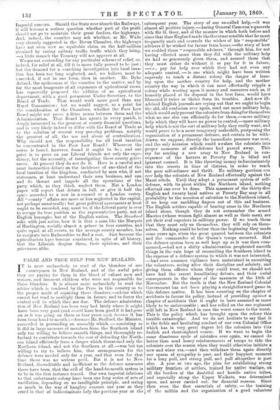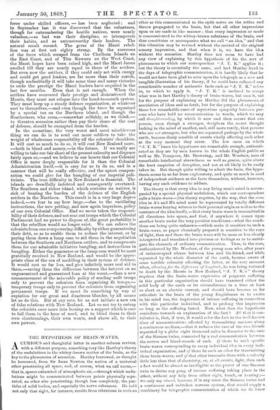FALSE AND TRUE HELP FOR NEW ZEALAND.
IT is most melancholy to read of the blunders of our countrymen in New Zealand, and of the awful price they are paying for them in the blood of valiant men and women, and innocent children who were not responsible for those blunders. It is almost more melancholy to read the advice which is tendered by the Press in this country as to the proper mode of repairing these disasters,—advice which cannot but tend to multiply them in future, and to foster the central evil to which they are due. The defence administration-of New Zealand has been very bad lately where it might have been very good (and ?eon/a have been good if it had gone on as it was going on three or four years ago). because it has been from hand to mouth ;—because Mr. Stafford, the Minister, succeeded in persuading an assembly which, — consisting as it did in large measure of members from the Southern island only too willing to believe smooth things, and thoroughly reluctant to contribute towards the cost of defending the Northern island efficiently from a danger which threatened only the Northern island, and not the Southern at all,—was but too willing to try to believe him, that arrangements for the defence were needed only for a year, and that even for that time there was no serious peril. But it is not to New Zealand, discreditable and inefficient as the defence measures there have been, that the evil of the hand-to-mouth system is to be in the first instance traced. Our own imperial relations to that unfortunate colony have been one long series of acts of vacillation, depending on no intelligible principle, and erring as much in the way of haughty censure one year as they erred in that of indiscriminate help the previous year or the subsequent year. The story of our so-called help,—it was almost all positive injury,—Juring General Cameron's quarrels with Sir G. Grey, and of the manner in which both before and since that time England made the Governor sensible that he must frequently snub and overrule the wishes of his "responsible" advisers if he wished for favour from home,—the story of how we scolded those "responsible advisers," through him, for not having effected more than they did with the military help we had so generously given them, and assured them that they must either do without it or pay for it in future, —i.e., pay for help over which they had not even any adequate control, — is one which might have been written expressly to teach a distant colony the danger of leaning upon the mother country for help, and the mother country the way in which it can most effectually cripple a colony while wasting upon it money and resources such as, if honestly placed at its disposal in the best form, would have liberated it twice or thrice from its troubles. And now illadvised English journals are crying out that we ought to begin the old, old confusion over again, send out more military help, which would only prevent the colonists from doing for themselves what no one else can efficiently do for them,—more military help which they will have no power to control,—more military help which is not the sort of military help they really want, and would prove to be a mere temporary makeshift, postponing the organization of a permanent defence, and certain to be withdrawn, we suppose, directly the immediate pressure was over, and the only occasion which could awaken the colonists into proper measures of self-defence had passed away. This cry for sending a new army to New Zealand in consequence of the horrors at Poverty Pay is blind and ignorant counsel. It is like throwing money indiscriminately into the streets in time of distress, in order to teach the poor self-reliance and thrift. No military garrison can ever help the colonists of New Zealand effectually against the Maori rebels. Until they adopt a permanent system of selfdefence, with its pivot within the Northern island, nothing effectual can ever be done. This massacre of the thirty-five English and twenty loyal natives at Poverty Bay may in all probability be the occasion of salvation to the Northern island, if we keep our meddling fingers out of this sad business. The English settlers capable of bearing arms in the Northern island alone, though they do not outnumber the armed Maories (whose women fight almost as well as their men), are yet their real superiors in military power. If we teach them that they must rely on themselves, they will rely on themselves. Nothing could be better than the beginning they made some years ago, when the great quarrel between the colonists and the commander of the Queen's troops occurred. Had the defence system been as well kept up as it was then commenced,—had not a shifty administration prophesied smooth things in the vain hope of reconciling the Southern island to the expense of a defence system in which it was not interested, —had even common vigilance been maintained in recruiting the volunteers, seeing after their discipline and sobriety, and giving them officers whom they could trust, we should not have had the recent humiliating defeats, and their awful consequences in the shape of the massacre of the 10th of November. But the truth is that the New Zealand Colonial Government has not been playing a straightforward game in this defence matter. It has been counting on the chapter of accidents to favour its policy, instead of providing against a chapter of accidents that it ought to have assumed as more likely to be unfavourable ; and has relied on the one regiment still left in New Zealand in case the worst comes to the worst. This is the policy which has brought upon the colony this terrible catastrophe. And we do not hesitate to say that it is the fickle and hesitating conduct of our own Colonial Office which has in very great degree led the colonists into this foolish and short-sighted course. If we want to begin the same disastrous cycle of mistakes over again, we cannot do better than send heavy reinforcements of troops to tide the colonists over the season when they would otherwise initiate a new and wiser era,—and then withdraw them again directly our spasm of sympathy is past, and their happiest moment for a long pull, and strong pull, and pull altogether is past also. A year or two ago, the plan for establishing strong military frontiers of settlers, trained for native warfare, on all the borders of the doubtful and hostile native tribes, and especially along the Upper Waikato, was determined upon, and never carried out, for financial reasons. Since then even the first essentials of safety, — the training of the militia and the organization of a good volunteer force under skilled officers, — has been neglected ; and in September last it was discovered that the volunteers, though far outnumbering the hostile natives, were nearly valueless,—so bad was their discipline, so intemperate their habits, and so untrustworthy their leaders. The natural result ensued. The germ of the Maori rebellion was at first not eighty strong. By the successes of the force which escaped from the Chatham Islands on the East Coast, and of Tito Kowuru on the West Coast, the Maori hopes have been raised high, and the Maori forces swelled till they are nearly equal to those of the settlers. But even now the settlers, if they could only act with energy and could get good leaders, are far more than their match, though undoubtedly it will take some time and many victories to undo the prestige the Maori leaders have acquired in the last few months. Even that is not enough. When the settlers have recovered their prestige and disheartened the Maoris, they must not relapse into the hand-to-mouth system. They must keep up a steady defence organization, at whatever cost to themselves,—and even though the force be organized by a special tax on the Northern island, and though the Southerners, who seem,—somewhat selfishly, as we think,— to threaten secession rather than pay their share of the cost of defence, should be exempted from the burden.
In the meantime, the very worst and most mischievous thing we can do is to send out more soldiers to take the weight of wholesome responsibility off the colonists' shoulders. It will cost us much to do so, it will cost New Zealand more, —both in blood and money,—in the future. If we really are willing to take our fair share of the present calamity and disgrace fairly upon us,—and we believe in our hearts that our Colonial Office is more deeply responsible for it than the Colonial Administration itself,—it is easy for us to do so, and in a manner that will be really effective, and the aptest compensation we could give for the bungling of our imperial politicians. The true difficulty in New Zealand is financial. The islands are dreadfully indebted and consequently overtaxed. The Southern and richer island, which contains no natives, is sick of bearing the burden of the defence of the English settlers in the Northern. This result is in a very large degree indeed,—we fear to say how large,—due to the vacillating instructions, the now petting, and now again imperious, policy of our own Colonial Office. Had we never taken the responsibility of their defence, and not sent out troops which the Colonial Parliament had no power to dispose of, the great probability is that the rebellion would no longer exist. We can relieve the colonists from one overpowering difficulty by either guaranteeing their debt, so as to enable them to reduce the interest, or by paying them down a lump sum to aid them in the negotiation between the Southern and Northern settlers, and to compensate them for our admirable initiative bungling, and instructions in bungling. Either the guarantee or the lump sum would be most gratefully received in New Zealand, and would be the appropriate close of the era of meddling in their system of defence. It would cost us far less, and give infinitely more real aid to them,—saving them the difference between the interest on an unguaranteed and guaranteed loan at the worst,—than a new commencement of the miserable policy of sending unfit troops only to prevent the colonists from organizing fit troops,— temporary troops only to prevent the colonists from organizing permanent troops. If we must do something by way of expiation for our great and disastrous blunder, by all means let us do this. But at any rate, let us not initiate a new era of false relations with New Zealand. Let us not try to entrap the colonists once more into leaning on a support which is sure to fail them in the hour of need, and to blind them to their own shortcomings, their own wants, and above all, to their own powers.































 Previous page
Previous page